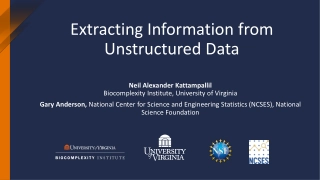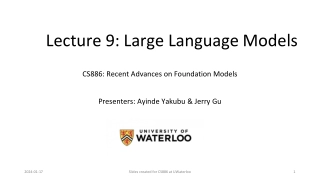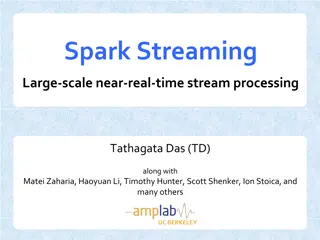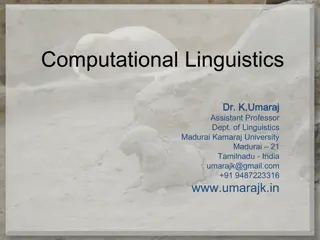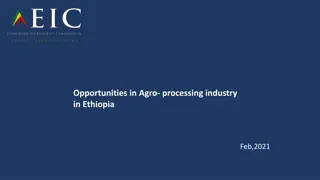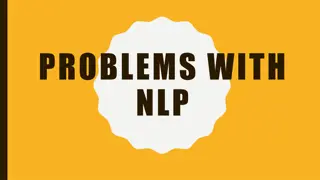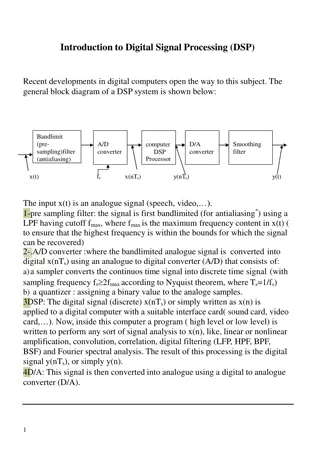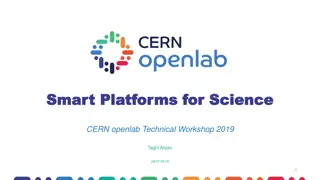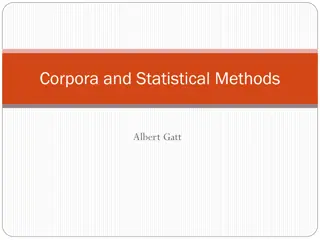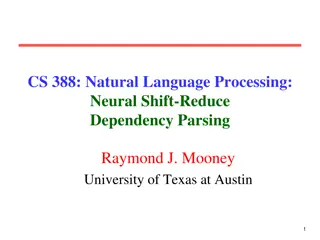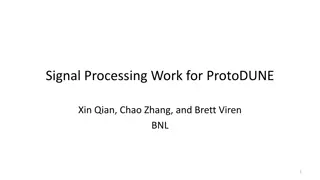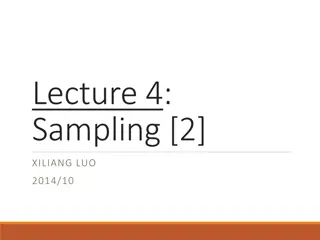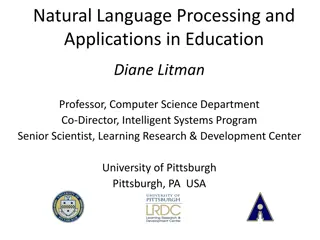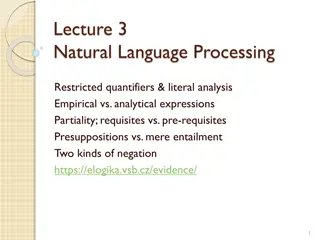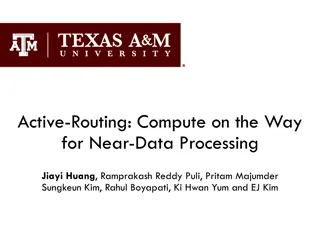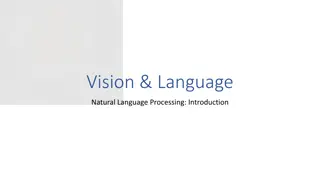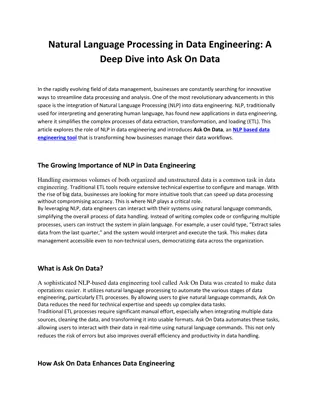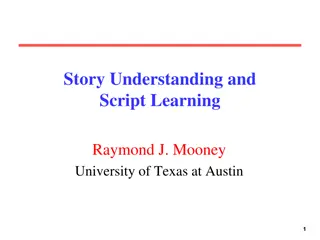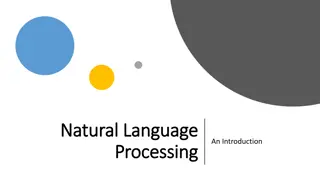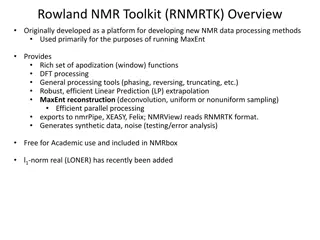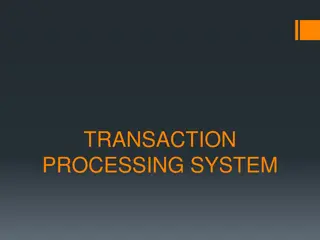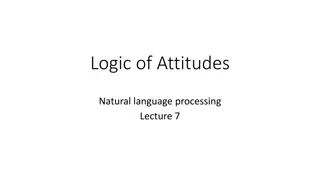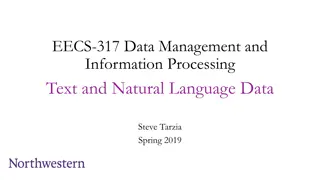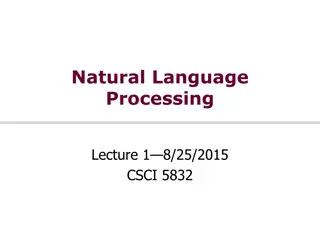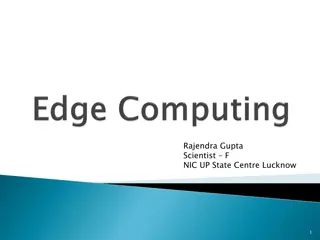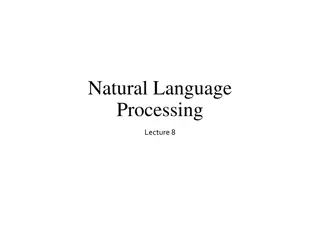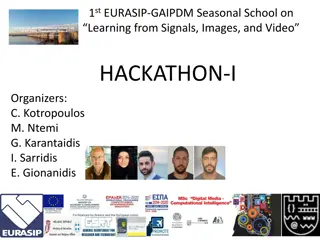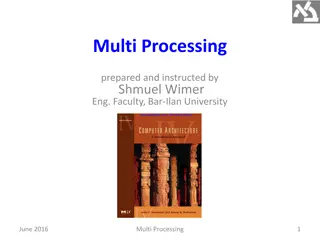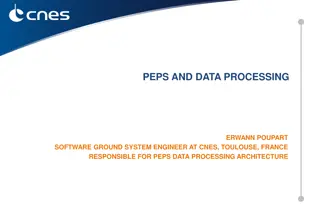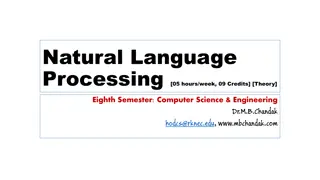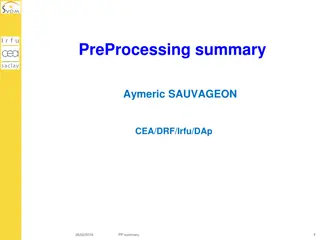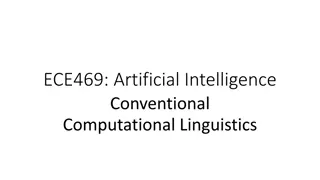Enhancing Business Innovation Measurement Using Natural Language Processing
Explore the use of alternative data sources and advanced methods like natural language processing and machine learning to enhance the measurement of business innovation. Focus on acquiring richer innovation measures from non-survey data, such as product announcements and financial filings. Assess th
0 views • 22 slides
National Food Processing Policy and Its Importance
National Food Processing Policy aims to address the significant wastage in food production through value addition and efficient processing. The policy highlights the reasons for food processing, including reducing losses in the supply chain and enhancing quality. It emphasizes creating an enabling e
1 views • 19 slides
Recent Advances in Large Language Models: A Comprehensive Overview
Large Language Models (LLMs) are sophisticated deep learning algorithms capable of understanding and generating human language. These models, trained on massive datasets, excel at various natural language processing tasks such as sentiment analysis, text classification, natural language inference, s
2 views • 83 slides
Introduction to Spark Streaming for Large-Scale Stream Processing
Spark Streaming, developed at UC Berkeley, extends the capabilities of Apache Spark for large-scale, near-real-time stream processing. With the ability to scale to hundreds of nodes and achieve low latencies, Spark Streaming offers efficient and fault-tolerant stateful stream processing through a si
0 views • 30 slides
Understanding Computational Linguistics and Natural Language Processing
Explore the fascinating fields of Computational Linguistics and Natural Language Processing (NLP), delving into their development, applications, and significance. Learn about the study of human languages in computational models, the importance of corpora in linguistic research, and the various types
1 views • 33 slides
Opportunities in Ethiopia's Agro-Processing Industry
Ethiopia stands out as a leader in raw material production for agro-processing industries, offering opportunities in dairy, juice processing, edible oil processing, poultry, beef production, and tomato processing. With abundant resources, suitable climate conditions, and a growing domestic market, E
0 views • 8 slides
Significance of Raw Materials in Food Processing
Effective selection of raw materials is crucial for ensuring the quality of processed food products. The quality of raw materials directly impacts the final products, making it important to procure materials that align closely with processing requirements. Quality evaluation, including microbiologic
2 views • 30 slides
Understanding Ambiguity in Natural Language Processing (NLP)
Natural Language Processing (NLP) faces challenges with ambiguity, which occurs due to multiple possible interpretations of language input. Humans can often resolve ambiguity, but it's complex for computers. Types of ambiguities include lexical, syntactic, pragmatic, referential, and transient. Over
2 views • 24 slides
Overview of Digital Signal Processing (DSP) Systems and Implementations
Recent advancements in digital computers have paved the way for Digital Signal Processing (DSP). The DSP system involves bandlimiting, A/D conversion, DSP processing, D/A conversion, and smoothing filtering. This system enables the conversion of analog signals to digital, processing using digital co
1 views • 24 slides
Advancements in Natural Language Processing for Scientific Research
Explore the role of Natural Language Processing tools in overcoming barriers in scientific research by lowering entry barriers and enhancing research efficiency. Learn about models like QANet and DSSM, along with the use of Machine Learning in Narrative interfaces and Chatbots for information retrie
0 views • 15 slides
Effective Strategies for Children with Developmental Language Disorder, Sensory Processing Disorder, and Fine Motor Delays
Children with Developmental Language Disorder (DLD), Sensory Processing Disorder (SPD), and Fine Motor Delays often have accompanying sensory and fine motor deficits. Research indicates that addressing sensory processing deficits can significantly benefit children with DLD, ADHD, autism, and other d
0 views • 61 slides
Introduction to Corpora and Statistical Methods in Natural Language Processing
This course, CSA5011, delves into statistical natural language processing, covering language formalization, Java as an artificial language, natural language complexity, and levels of analysis in phonetics, morphology, syntax, and semantics.
1 views • 34 slides
Neural Shift-Reduce Dependency Parsing in Natural Language Processing
This content explores the concept of Shift-Reduce Dependency Parsing in the context of Natural Language Processing. It describes how a Shift-Reduce Parser incrementally builds a parse without backtracking, maintaining a buffer of input words and a stack of constructed constituents. The process invol
0 views • 34 slides
Advancements in Signal Processing for ProtoDUNE Experiment
The team, including Xin Qian, Chao Zhang, and Brett Viren from BNL, leverages past experience in MicroBooNE to outline a comprehensive work plan for signal processing in ProtoDUNE. Their focus includes managing excess noise, addressing non-functional channels, and evolving signal processing techniqu
1 views • 23 slides
Understanding Sampling and Signal Processing Fundamentals
Sampling plays a crucial role in converting continuous-time signals into discrete-time signals for processing. This lecture covers periodic sampling, ideal sampling, Fourier transforms, Nyquist-Shannon sampling, and the processing of band-limited signals. It delves into the relationship between peri
1 views • 60 slides
Natural Language Processing in Education: Overview and Applications
Natural Language Processing (NLP) plays a crucial role in education by enabling computers to understand and generate human language. NLP is essential due to the abundance of machine-readable text, audio, and video data available today, leading to the development of conversational agents like Siri an
0 views • 92 slides
Understanding Empirical vs Analytical Expressions in Natural Language Processing
Restricted quantifiers and literal analysis in natural language processing reveal the distinctions between empirical and analytical expressions. While empirical expressions refer to non-trivial intensions that require empirical investigation, analytical expressions denote constant intensions that ca
1 views • 19 slides
Enhancing Near-Data Processing with Active Routing
Explore the implementation and benefits of Active-Routing for efficient data processing in memory networks. Motivated by the increasing demands for memory in graph processing and deep learning, this approach aims to reduce data movement, energy consumption, and costs associated with processing large
0 views • 46 slides
Challenges in Natural Language Processing Explained
Natural Language Processing (NLP) involves automatic reasoning over text, presenting unique challenges like understanding language nuances and complexities. This introductory overview delves into the fundamentals of NLP, highlighting common tasks such as language modeling and ML representations. Del
0 views • 59 slides
Natural Language Processing in Data Engineering A Deep Dive into Ask On Data
In the rapidly evolving field of data management, businesses are constantly searching for innovative ways to streamline data processing and analysis. One of the most revolutionary advancements in this space is the integration of Natural Language Proc
0 views • 2 slides
Introduction to Language Technologies at Jožef Stefan International Postgraduate School
This module on Knowledge Technologies at Jožef Stefan International Postgraduate School explores various aspects of Language Technologies, including Computational Linguistics, Natural Language Processing, and Human Language Technologies. The course covers computer processing of natural language, ap
0 views • 27 slides
Evolution of Natural Language Processing in AI Research
The evolution of Natural Language Processing in AI research from the 70s and 80s focused on knowledge representation, complex inference, story understanding, and script learning. Concepts like Conceptual Dependency and Scripts were developed to represent meaning and improve text understanding. Howev
0 views • 58 slides
Introduction to Natural Language Processing
Natural Language Processing (NLP) is a field that focuses on enabling computers to understand, interpret, and generate human language. It involves tasks such as machine translation, information extraction, text summarization, dialogue systems, tagging, and speech recognition. NLP presents challenges
0 views • 26 slides
Overview of RNMRTK Software for NMR Data Processing
Rowland NMR Toolkit (RNMRTK) is a comprehensive software platform primarily used for NMR data processing tasks such as running MaxEnt, apodization, DFT processing, linear prediction, and more. It offers a robust set of tools for various processing needs and supports efficient parallel processing. RN
0 views • 17 slides
Understanding Transaction Processing Systems (TPS)
Transaction Processing Systems (TPS) are vital components in capturing, storing, and processing data generated from various business transactions. They ensure efficient handling of high volumes of data while maintaining accuracy, security, and privacy. TPS operate through automated data entry, batch
0 views • 24 slides
Understanding Language Anxiety in Foreign Language Learning and Teaching
Explore the impact of language anxiety on students and teachers in foreign language learning and teaching contexts through insights from Dr. Christina Gkonou's research. Delve into the theoretical background, implications for language education, and real-life experiences shared at the Essex Language
0 views • 25 slides
Understanding Semantic Concepts in Natural Language Processing
Explore the world of Natural Language Processing (NLP) through images and explanations, covering topics such as text similarity, dimensionality reduction, semantic matching, and the challenges with vector similarity. Dive into the concept space, TOEFL synonyms, SAT analogies, and the importance of r
0 views • 39 slides
Centre of Excellence in Signal Processing Activities and Progress Report
Broad areas of signal processing activities at the Centre of Excellence in Signal Processing include audio, speech, language, medical image processing, computer vision, wireless communications, and machine learning. The center focuses on addressing various challenges in audio/speech recognition, emo
0 views • 17 slides
Understanding Natural Language Generation (NLG) Process
Natural Language Generation (NLG) is the process of constructing natural language outputs from non-linguistic inputs. It involves generating text from machine representations to meet specific communicative goals. NLG is distinct from Natural Language Understanding (NLU) as it maps meaning to text, w
0 views • 38 slides
Understanding Propositional and Notional Attitudes in Logic and Natural Language Processing
Explore the intricate concepts of propositional and notional attitudes in the context of logic and natural language processing. Dive into the distinctions between belief, knowledge, seeking, finding, solving, wishing, and wanting within the realms of individual intensions and hyper-intensions. Under
0 views • 16 slides
Understanding Natural Language Data Processing
Exploring aspects of natural language data, covering topics like the differences between natural and formal languages, challenges in processing natural languages for machines, and examples of dealing with natural language data such as Yelp reviews. The content also touches on big data concepts, hash
0 views • 26 slides
Introduction to Natural Language Processing and its Applications
Natural Language Processing (NLP) explores the algorithms and principles behind enabling computers to understand and generate human language. It involves processing large amounts of machine-readable text data and developing systems like text analytics, conversational agents (e.g., Siri, Cortana, Goo
0 views • 37 slides
Understanding Edge Computing for Optimizing Internet Devices
Edge computing brings computing closer to the data source, minimizing communication distances between client and server for reduced latency and bandwidth usage. Distributed in device nodes, edge computing optimizes processing in smart devices instead of centralized cloud environments, enhancing data
0 views • 32 slides
Understanding Advanced Smoothing Algorithms in Natural Language Processing
Dive into the world of advanced smoothing algorithms like Good-Turing, Kneser-Ney, and Witten-Bell used in Natural Language Processing. Explore concepts such as Good-Turing Smoothing Intuition, Unigram Prior Smoothing, and more general formulations for better language modeling through statistical te
0 views • 21 slides
Innovative Research Projects in Signal Processing, Tourism, and Language Translation
This text introduces several cutting-edge research projects in different domains, including signal processing, tourism recommendation systems, price prediction, hotel rating anticipation, and natural language processing for translations. Each project aims to solve unique challenges using advanced te
0 views • 5 slides
Understanding Multi-Processing in Computer Architecture
Beginning in the mid-2000s, a shift towards multi-processing emerged due to limitations in uniprocessor performance gains. This led to the development of multiprocessors like multicore systems, enabling enhanced performance through parallel processing. The taxonomy of Flynn categories, including SIS
0 views • 46 slides
Insight into PEPS Data Processing Architecture by Erwann Poupard
Erwann Poupard, a Software Ground System Engineer at CNES, Toulouse, France, plays a crucial role in the PEPS data processing architecture. The outline covers PEPS HPSS data storage statistics, current data processing trends, and future plans including PEPS V2 development. Explore PEPS processing ch
0 views • 8 slides
Comprehensive Course on Natural Language Processing
This eighth-semester course in Computer Science & Engineering covers the fundamentals of Natural Language Processing (NLP) including basics, modeling techniques, syntactic and semantic parsing, information extraction, and machine translation. Prerequisites include knowledge of English grammar, theor
1 views • 16 slides
Data Processing and Preprocessing Summary
In this document, Aymeric Sauvageon from CEA/DRF/Irfu/DAp presents a detailed overview of the preprocessing steps involved in data processing from L0 to L1. It covers the definition of L0/L1 and coding, utilization of the database for processing, input file specifications from China, packet content
0 views • 11 slides
Understanding Natural Language Processing: Disciplines and Challenges
Natural Language Processing (NLP) is a subset of AI dealing with processing human languages. This field is intertwined with linguistics, psychology, philosophy, and computational linguistics. Challenges in NLP arise due to the complexities of language understanding, as illustrated by parsing sentenc
0 views • 40 slides
